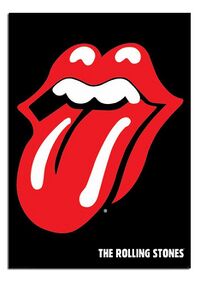The Rolling Stones: Difference between revisions
No edit summary |
|||
| Line 1: | Line 1: | ||
[[Category:Negative Influences on Morrissey]] | [[Category:Negative Influences on Morrissey]] | ||
[[File:The Rolling Stones logo.jpg | 200px | right | thumb |The Rolling Stones logo]] | |||
==Relevance== | ==Relevance== | ||
In [[Mention::Autobiography]], Morrissey describes: | In [[Mention::Autobiography]], Morrissey describes: | ||
Latest revision as of 14:59, 20 April 2023
Relevance
In Autobiography, Morrissey describes:
"In New York, Mick Jagger arrives backstage and extends the hand of friendship. It is a big moment for Johnny, but I, of course, am a nightmare of judgment, and it takes me years to understand the genius secret of the Rolling Stones. Dismissal can be a secret form of arrogance, and I held this proudly against the Stones until the light shifted and I caught myself being utterly wrong. The in-built censorship can also often be a substitute for not actually knowing any better, and I now agonize over my criticisms of the Stones – with blather that was anything but a true reflection of the facts. In any case, Mick Jagger only stayed for four songs into the Smiths’ set, but I felt no hurt at his departure because I could, even then, understand how my general being (which we dare not term a persona) was difficult for a lot of people to take."
Mentioned In
- Morrissey Missed The Bus - Q Magazine (November 2001)
- Morrissey: Un dandy de camisa abierta - Clarín.com (Argentina) (December 2, 2018)
Discogs Information
Profile
English rock band formed in London in May 1962. They are one of the longest-lived and most commercially successful groups in rock history. Inducted into the Rock And Roll Hall of Fame in 1989 (Performer).
Band members
05/1962 - 05/1963 Ian Stewart (Keyboards, piano)
05/1962 - 06/1969 Brian Jones (5) (Lead and rhythm guitars)
06/1962 - 10/1962 Dick Taylor (2) (Bass)
06/1962 - 12/1962 Tony Chapman (Drums)
06/1962 - present Mick Jagger (Lead vocals, harmonica, percussion) Keith Richards (Lead and rhythm guitars, acoustic guitar, backing vocals)
12/1962 - 01/1993 Bill Wyman (Bass)
01/1963 - 08/2021 Charlie Watts (Drums and percussion)
07/1969 - 12/1974 Mick Taylor (Lead and slide guitars)
03/1975 - present Ron Wood (Guitars, backing vocals)
External Links
- https://www.discogs.com/artist/20991-The-Rolling-Stones
- https://en.wikipedia.org/wiki/The_Rolling_Stones_discography
- http://rollingstones.com
- http://www.universal-music.de/rolling-stones
- http://www.bbc.co.uk/music/artists/b071f9fa-14b0-4217-8e97-eb41da73f598
- http://www.britannica.com/topic/the-Rolling-Stones
- http://web.archive.org/web/20021119181623/http://classicwebs.com/rstones.htm
- http://www.facebook.com/therollingstones
- http://rollingstones.fandom.com/wiki/Home
- http://genius.com/artists/The-rolling-stones
- http://www.imdb.com/name/nm1213869
- http://www.instagram.com/therollingstones
Wikipedia Information
 |
The Rolling Stones are an English rock band formed in London in 1962. Active for over six decades, they are one of the most popular and enduring bands of the rock era. In the early 1960s, the band pioneered the gritty, rhythmically driven sound that came to define hard rock. Their first stable line-up consisted of vocalist Mick Jagger, guitarist Keith Richards, multi-instrumentalist Brian Jones, bassist Bill Wyman, and drummer Charlie Watts. During their early years, Jones was the primary leader. Andrew Loog Oldham became their manager in 1963 and encouraged them to write their own songs. The Jagger–Richards partnership soon became the band's primary songwriting and creative force. Rooted in blues and early rock and roll, the Rolling Stones started out playing covers and were at the forefront of the British Invasion in 1964, becoming identified with the youthful counterculture of the 1960s. They then found greater success with their own material, as "(I Can't Get No) Satisfaction", "Get Off of My Cloud" (both 1965), and "Paint It Black" (1966) became international number-one hits. Aftermath (1966), their first entirely original album, is often considered to be the most important of their early albums. In 1967, they had the double-sided hit "Ruby Tuesday"/"Let's Spend the Night Together" and experimented with psychedelic rock on Their Satanic Majesties Request. By the end of the 1960s, they had returned to their rhythm and blues-based rock sound, with hit singles "Jumpin' Jack Flash" (1968) and "Honky Tonk Women" (1969), and albums Beggars Banquet (1968), featuring "Sympathy for the Devil" and "Street Fighting Man", and Let It Bleed (1969), featuring "You Can't Always Get What You Want" and "Gimme Shelter". Jones left the band shortly before his death in 1969, having been replaced by Mick Taylor. That year they were first introduced on stage as "the greatest rock and roll band in the world". Sticky Fingers (1971), which yielded "Brown Sugar" and "Wild Horses" and included the first usage of their tongue and lips logo, was their first of eight consecutive number-one studio albums in the US. It was followed by Exile on Main St. (1972), featuring "Tumbling Dice" and "Happy", and Goats Head Soup (1973), featuring "Angie". Taylor left the band at the end of 1974 and was replaced by Ronnie Wood. The band released Some Girls in 1978, featuring "Miss You" and "Beast of Burden", and Tattoo You in 1981, featuring "Start Me Up". Steel Wheels (1989) was widely considered a comeback album and was followed by Voodoo Lounge (1994). Both releases were promoted by large stadium and arena tours, as the Stones continued to be a huge concert attraction; by 2007, they had broken the record for the all-time highest-grossing concert tour three times, and they were the highest-earning live act of 2021. Following Wyman's departure in 1993, the band continued as a four-piece core, with Darryl Jones becoming their regular bassist, and then as a three-piece core following Watts' death in 2021, with Steve Jordan becoming their regular drummer. Hackney Diamonds, the band's first new album of original material in 18 years, was released in October 2023, becoming their fourteenth UK number-one album. The Rolling Stones' estimated record sales of more than 250 million make them one of the best-selling music artists of all time. They have won three Grammy Awards and a Grammy Lifetime Achievement Award. They were inducted into the Rock and Roll Hall of Fame in 1989 and the UK Music Hall of Fame in 2004. Billboard and Rolling Stone have ranked them as one of the greatest artists of all time.
